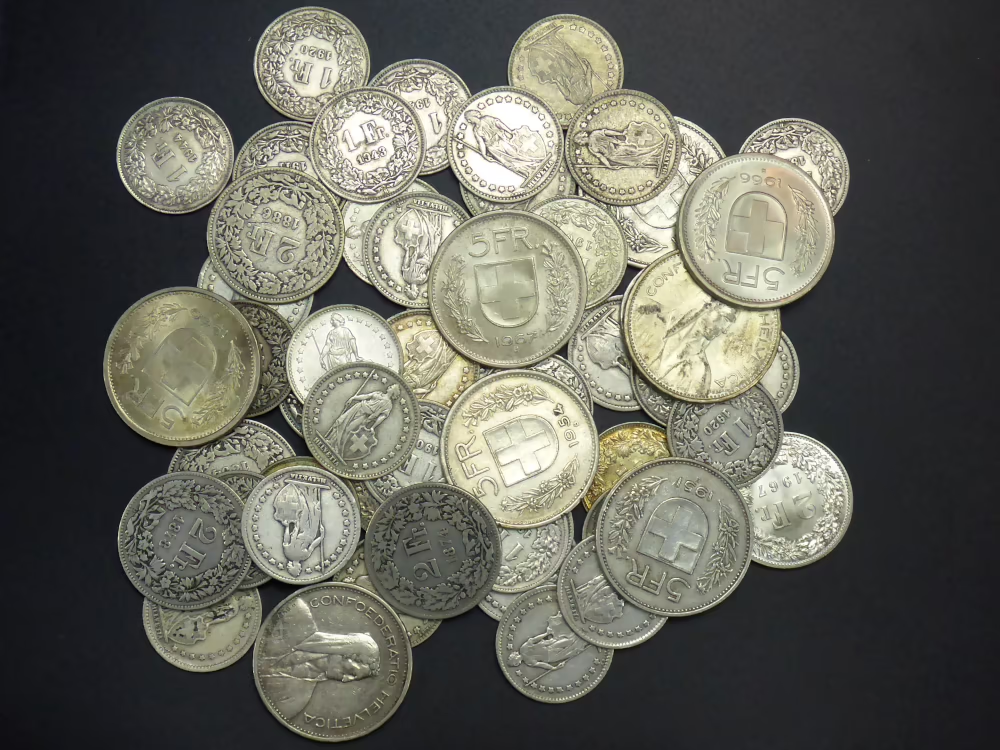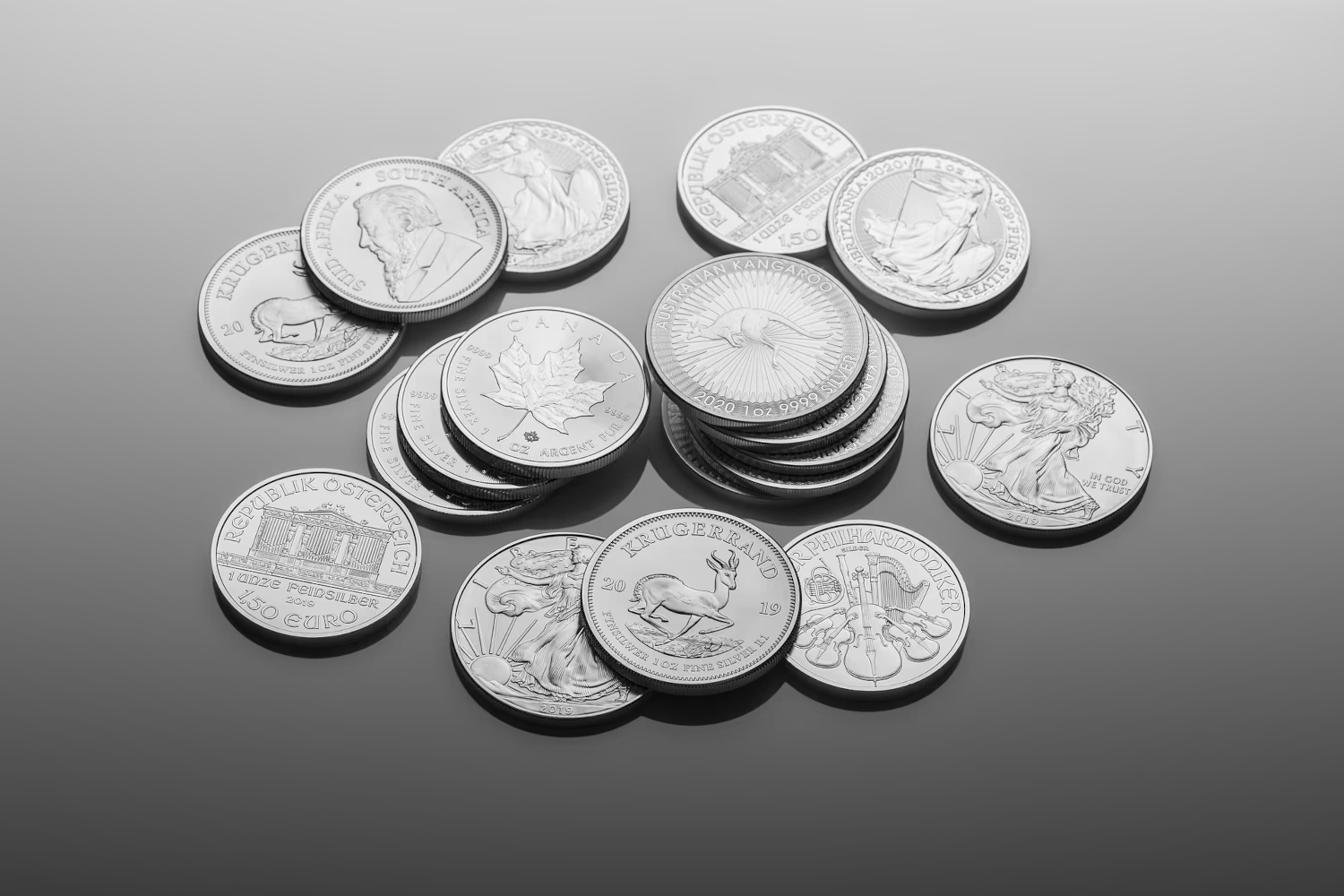Buying silver
Summary
-
Silver has been used as money for thousands of years.
-
Today, silver is used in industry, as jewellery and as security.
-
The world's silver reserves are finite.
-
For savers, silver is suitable in the form of bars, coins and, to a certain extent, medals.
-
The premium on the stock market price is higher for silver than for gold, and this is not only due to the VAT that has to be paid on silver.
-
Silver can also be bought VAT-free, provided you are willing to store it in a bonded warehouse.
-
The LBMA also certifies silver refineries.
-
Silver can be bought in Switzerland from banks, dealers and other private individuals through PreMeSec.ch.
Introduction to buying silver
This article is not only about buying silver itself, but also about the different forms and uses of silver. Although silver has a lot in common with gold, there are still some important differences to consider when deciding whether to buy silver or to buy gold.
Important note: Disclaimer and riskThis blog post is intended solely for informational purposes and the critical assessment of facts. We would like to help you form your own opinion and better understand the financial markets. This text does not constitute investment advice!
|
Why buy silver?
Silver has been used as money for thousands of years. As late as the last century, curant coins, i.e. coins whose value is covered by the metal they contain, were issued by various states. This long tradition of silver as money makes that people still buy silver today.
The fact that mineable supplies of silver are finite and will be mined out before the end of this century, unless new deposits are discovered, causes some people to dream of high increases in the price of silver. The fact that silver is hardly recycled exacerbates this problem.
In industry, silver is used in various areas, as a conductor in electronics, as an antibacterial surface coating, as a component in batteries and much more. So there is always an industrial demand for silver, which is seen as an advantage over gold, which is mainly a luxury object.
The last thing to mention is the use of silver as a jewellery metal, which also drives the demand for the precious metal. The demand for it gives savers the security of always finding a buyer for the silver they have acquired.
Silver is bought in order to participate in the increase in value or as a gift or also to have a barter item should the classical currency system fail. Since silver served as money for thousands of years and is still very important today as an industrial metal, it is excellently suited for all these applications.

Which silver is suitable for savers?
Today, silver comes in many different forms. Old circulation coins, cutlery, jewellery, granules, medals, modern silver coins (Silver Philharmonic, Silver Krugerrand, Silver Maple Leaf) or as bars.
Old silver such as cutlery and old jewellery are not suitable for savers. As these are relatively costly as trading goods - the purity has to be tested on every single product and each one has to be weighed individually - the surcharges on them are very high.
Old circulation coins represent a small value per coin, which also leads to high mark-ups. However, because they all have the same fineness, they are suitable as a medium of exchange for people who expect the monetary system to fail.
Granules are the raw material for many companies that process silver. It is traded in sealed bags of several kilograms with a high fineness of 999 or 999.9. Even though it is occasionally offered at a low price, it is not suitable for private savers. The purity of the granulate guaranteed by the manufacturer only applies as long as the bags are not opened or damaged. However, since the bags are made of plastic and become brittle after a few years, they are not suitable for savers and are also too valuable as barter objects.
Medals made of silver are usually produced with a low weight in small numbers and very elaborately decorated. These three factors mean that medals are often sold far above their material value, especially as the material value of medals is never the main consideration. For this reason, they are not suitable for silver savers.
Modern silver coins are a very good choice for savers, they are produced in large numbers, they are official means of payment, which gives them a special legal status in some countries, they are internationally known and they are, with the weight of usually one ounce, i.e. 31.1 grams, an excellent means of exchange for everyday use in case the local currency fails. For savers who only want to earn from the value of silver, however, they are only suitable to a limited extent, as they have a high premium compared to bars.
Bars are the product for savers, and here you can choose from a wide variety of manufacturers in a wide variety of sizes. The usual finenesses are 999 and 999.9. Bars are available in sizes from 5 grams up to 1000 ounces, which corresponds to about 31 kg. Due to the large selection, the buyer can choose exactly the right size for his purposes. Only the 1000 ounce bars, also known as standard bars, are not recommended, they are produced according to LBMA standards and may weigh between the recommended 28 and 34 kilograms and the weight should not be imprinted. These specifications make trading these bars more complicated than other bars where the weight must be exactly right and it is also stamped. This higher effort is then also deducted from the price when reselling 1000 ounce bars. That is why savers who want to buy large quantities of silver should stick to the usual 15 or 5 kg bars.
What should you look for when buying silver?
Silver sold in Switzerland must comply with the legal requirements of the Precious Metals Control Act. This law stipulates that the purity of the silver must be stamped and that the assayer or smelter who confirms the purity must also put his responsibility mark next to it. Only silver with these two stamps can be sure that it is genuine silver.
What does silver cost?
Silver is an industrial raw material and is also traded on the stock exchange, so the price of silver is generally known. The surcharges that have to be paid on silver are somewhat less transparent, but in general it can be said that the larger the piece of silver, the smaller the surcharge relative to the weight. For an ounce, for example, you can expect a surcharge of about 33 %, while the surcharge for a kilogramme of bar is only 20 %. The value-added tax is already included in this calculation.
![Schweizer Silber Münzen und Barren vor silbrigem Hintergrund. © PreMeSec GmbH]](../../../../content/silber-barren-muenzen-medaillen-silber-hintergrund-2.avif)
Buying silver without VAT
For buyers who only want to participate in the appreciation of silver, the VAT is of course a nuisance. However, since silver is considered a raw material, the VAT on silver must be paid even if it is not bought for industrial purposes. While Swiss companies can theoretically recover and keep the VAT when they sell, this option is not available to private individuals. Of course, companies incur capital costs in this case, but this is simply part of the cost of doing business in manufacturing companies and is not as significant because of the rapid turnover of goods. However, for pension funds, insurance companies and similar businesses that hold silver for years, the costs are large.
So the question arises for private individuals and companies alike whether it would not be possible to buy and store silver without VAT. Fortunately, Swiss duty-free warehouses offer this possibility. If goods are imported into Switzerland from abroad, they can be temporarily stored in a bonded warehouse before final importation. No additional defence taxes have to be paid for goods stored in duty-free warehouses. The taxes are only due when the goods are removed from the warehouse and imported into the Swiss customs territory, i.e. Switzerland. In the case of a re-export, Swiss VAT does not have to be paid either.
This means that a saver can buy silver without paying VAT, store the silver in the duty-free warehouse and sell it to someone else at some point. This person then either continues to store the silver, imports it into Switzerland or exports it again directly from the bonded warehouse. For the saver himself, it doesn't really matter what the buyer does with the silver, the important thing is that he has never paid VAT.
Today, various precious metal dealers also offer duty-free silver, but to store silver duty-free you also need the services of a specialised storage company. Some dealers also offer storage, but this often has the disadvantage that the silver can only be sold to this dealer. It is important to have a claim to the surrender of the precious metals, because then you can resell the silver to any buyer and are not bound to the prices of the dealer from whom you bought it.
On PreMeSec, duty-free stored silver can be displayed to potential customers with a single click.
Trade duty-free stored silver on PreMeSec!
The importance of the LBMA when buying silver
Anyone who buys silver also comes into contact with the abbreviation LBMA, this stands for London Bullion Market Association, which is the name of an important over-the-counter precious metals trading association. The price of gold and silver is set daily on the London Bullion Market. The LBMA also certifies precious metal refineries. The certification of the producer guarantees buyers minimum standards for the quality of the precious metal they buy.

Where can you buy silver?
Switzerland is a hub in the international precious metals trade, about 60% of the gold mined annually is refined in Switzerland and the amount of refined silver is also very high. It is therefore hardly surprising that silver is easy to trade in Switzerland. Two thirds of the Swiss buy their precious metal from their house bank, and there are also precious metal dealers. The range of different silver bars has been steadily reduced in recent years, so that often only the one-kilogram bars are available at banks. If you want to trade silver with private individuals, you can use premesec.ch.
Can I buy silver anonymously?
Like gold, silver can be bought anonymously in Switzerland from precious metal dealers in spot transactions for up to CHF 15,000 and paid for with cash. Since banks only sell precious metals to their own customers, anonymous purchases are not possible. In other EU countries, the limits for the anonymous purchase of silver are for the most part much lower, in Germany 2000€, in Italy even only 1000€.
When trading silver between private persons there is no upper limit, nevertheless we recommend to always trade precious metals against receipt only.
What are the advantages of silver over other precious metals?
Silver is used for various purposes in different industries and is also used in large quantities in the jewellery industry. This resulting large demand is of course a significant advantage over the other precious metals such as gold, platinum and palladium, which are more expensive but are only consumed in smaller quantities.
The ratio between the silver already mined and the new silver mined each year, also called the stock-to-flow ratio, is very high. At today's rate of mining, it would take over 22 years to mine that much silver again. A collapse in production would therefore have a much faster impact on the price than in the case of gold, where the stock-to-flow ratio is 70.
Frequently asked questions about buying silver
Where should you buy silver?
-
Silver can be bought from banks and precious metal dealers, but usually silver from private sellers is cheaper and more readily available.
Where should I sell silver?
-
Since banks and precious metal dealers only pay the metal price, it is advisable to sell silver to other private individuals, so that a substantial part of the mark-up charged by dealers or banks on resale can be claimed.
Which silver should one buy?
-
For private individuals, bars, modern silver coins such as the Vienna Philharmonic or old silver money, which is traded close to the silver price, are suitable. Medals should only be bought if they are traded close to the silver price.
Should private individuals buy standard silver bars?
-
Standard bars should be seen as a commodity and as a product for banks and insurance companies; they are not suitable for private individuals because of the high fees and the high price.
How to buy silver without paying VAT?
-
There is no VAT on silver stored in bonded warehouses. So silver can be bought and held without ever paying VAT.
Should one buy silver or gold?
-
Which precious metal to buy depends very much on your own circumstances and plans. Since gold must be seen primarily as an investment product and silver is mainly an industrial metal, these precious metals differ considerably. In most cases it makes sense to buy both precious metals, then of course the question arises how much money should be invested in the respective metal.
